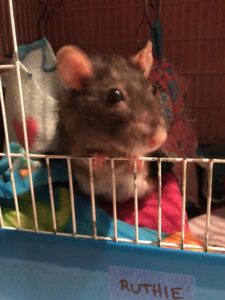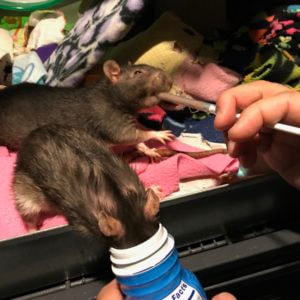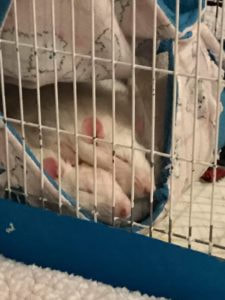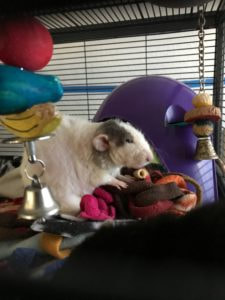 Ruthie Ruthie We’re now half way through our 20th anniversary blog series and I feel it’s time to cover the basics of maintaining sanctuary rats. These are senior rats and rats with special needs – be it physical, emotional, behavioral, or otherwise. Unfortunately, rats have very short life expectancies and, in my humble opinion, if your rat lives to see 2, then that is a full life. The average life expectancy is 2-3 years with very few rats, in my experience, making it much past 3 years of age. There are a lot of factors that play into the overall health and longevity of your rats but, when you choose to adopt, you have little control over factors like genetics and care/maintenance before the rat came into your care. You adopt your rats as they are when they come into your life. As such, some may already be senior or need special care. 18-24 months of age is getting old. 2+ years would definitely be considered “senior.” Here at Rattie Ratz, we judge “senior” by chronological age (if available) but also by overall health and condition because, just like people, rats age differently. “Special needs” rats are labeled that way for a variety of reasons.  Ruthie and Sampson Ruthie and Sampson Since these articles are intended for beginners, I am going to spend most of my time discussing the care and maintenance of your rats as they age and become seniors. Everyone keeping rats for the lifetime of the animal will, at some point, be caring for a senior rat. Senior rats are just old rats and, with age comes health issues like cataracts, respiratory illness, hind end degeneration, weak limbs, lethargy, and more. Just like people, aging rats might begin to lose weight, have thinning fur, sleep more, eat less, and generally not be able to get around quite like they used to when they were in the prime of their life. As such, it is your responsibility to make sure that their changing needs are being met and their current activity level and mobility is being considered. Rats that used to enjoy multi-level cages may need to move into single story cages to protect them from falling off ledges and injuring themselves. Make sure that food and water are readily and *easily* available and accessible to your senior rats. If you maintain a mixed age colony, make sure you are catering to your seniors and any special needs rats in the space.  Patricia, Didi & Helen Patricia, Didi & Helen Older rats still enjoy hammocks but might not be able to climb to get into them. Consider making sure a hammock is very low to the ground so elderly rats can try to pull themselves in. Despite being old, the mobility and determination of senior rats can surprise you! Make sure food and water are on the ground level. If your senior is having issues being able to chew their food, consider soaking the food in water to soften it up or, if they used to enjoy raw foods, consider cooking them a bit to soften them up. Many people will supplement a soft block diet with baby foods and cereals that are easier for their elderly rats to lick up. In the golden years for your rats, I don’t worry too much about what they are eating. It’s important to make sure they are eating and keeping weight on. I typically identify weight loss as really the beginning of the end and that is one of the signs I use to help prepare myself, emotionally, for their passing. If your rat starts to lose weight, you can try offering something like Nutri-Cal which is a high calorie supplement paste, or Pediasure/Ensure, that most rats seem to like. I really enjoy offering my seniors a wide variety of tasty treats because I prefer to make their senior time as enjoyable as possible.  Emery Emery As always, as your rats age, their immune systems also age and start to break down. They aren’t able to fight off illness, injuries, and/or infections quite like they used to. As a result, you may find that they need more and/or stronger medications to help keep respiratory and other issues in check. It’s important to have a relationship with a great rat vet before you need to go to a vet. As you grow in your knowledge and experience, you’ll be able to choose to treat many issues and illnesses on your own but, until then, please make sure that you have a vet you can go to when your rats start to get old. A knowledgeable vet can help make end of life care more painless and manageable. Also, when the time is right, it may be decided that it is in the animals’ best interest to be euthanized and a vet will be needed to perform this procedure. I insist on being present if I need to euthanize a senior rat and this is something you will need to review with your vet team in advance because some offices will not permit owners to be present. Although senior rats would be considered “special needs,” there are plenty of other reasons why a rat may be deemed a “special needs” animal. If a rat sustained an injury which resulted in the loss of something useful like a limb, tail, or eye, that would be a special needs rat. You would need to make appropriate cage/food/medication alterations to accommodate whatever physical disability your rat has. Rats are also labeled as special needs due to behavioral issues. If a rat is particularly aggressive to other rats or people, if they are scared/traumatized, or if they have some other neurological condition, these are all considered special needs and would have to be evaluated to determine what is best for the animal. Since I am assuming you are a beginner, I am not going to go into each of these cases. Beginners really would not likely start with adopting a special needs animal. It is much more likely that you have adopted young rats and they are now getting old and worn down.  Digit Digit Regardless of your rats’ age, please do not underestimate their actual motivation and abilities. Rats are very smart, resilient, and creative. I’ve seen elderly rats, with complete hind end paralysis, drag themselves up onto different levels of their space! Missing eyes, parts of tails, and limbs don’t seem to slow too many down either! Rats adapt and, if they want something bad enough, they will figure out a way to make it happen. The most important takeaway from this is just to be observant, kind, and compassionate. If you notice that your rat isn’t getting around quite like they used to, make modifications proactively. Moving to single level cages, fleece for bedding, and softer foods are very common for older rats. They shouldn’t be expected to run around an entire cage anymore. They are expecting you to consider them and their aging needs and work to make their space as safe and comfortable for them as possible in their senior months.
0 Comments
Leave a Reply. |
AuthorDiane Weikal, founder of Rattie Ratz, wrote this monthly blog in celebration of our 20th anniversary of rescuing rats! Archives
December 2018
Categories |
|
© Copyright 2024 Rattie Ratz
California Registered Public Benefit Org United States Tax Exempt Organization 501(c)(3) IRS FEIN #94-3400283 |

 RSS Feed
RSS Feed